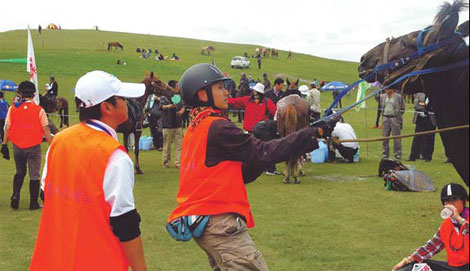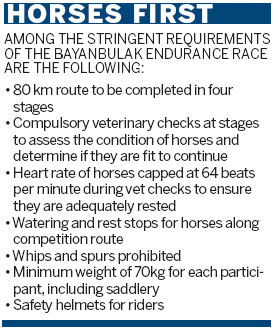Playing horse whisperer
 |
| The writer gets the horse ready for the next leg of the endurance race. |
I am advised to spot expert riders and try keeping pace with them during the first few legs of the race. Many others have the same idea and we all storm off during the first 16-km stretch.
In a country where equestrian sport is experiencing a resurgence, endurance racing is considered its most popular event.
"Adopting international standards for equestrian endurance racing marks a major shift that rides on the growing popularity of the sport," says Wutzala, press officer of the China Equestrian Association and chief editor of its website.
Competitor Cao Hua, who arrived at Bayanbulak with fellow riders from Chongqing, says: "I've only started horse riding about half a year ago, but I'm hooked.
"I didn't expect the horses to be this good. It's also a great chance to admire the beauty of Bayanbulak."
Cao was one of the participants who went on to complete the race.
Azhati Tuerxun, head of Xinjiang's sports bureau and chairman of its equestrian association, says the race this year is more than just about winning.
"This area is rich in horse culture and nature. We hope more people are able to appreciate these through the race," he says.
Other than its pristine prairies, Bayanbulak is also famous for its Swan Lake, a more than 300 square-meter-large water body. It is the country's sole wild swan reserve and one of largest of its kind in the world.
But after more than three hours into the race, I am in no mood to enjoy the scenery. I am already more winded than my horse under a scorching afternoon sun. My unconditioned limbs grow numb and weigh down on my horse, which displays its Mongolian pedigree by settling into a steady gait.
That is when I realize that rhythm reigns supreme in an endurance competition. Many riders who drove their horses to the lead during the initial legs of the race do not make it through the subsequent vet checks, because they do not have sufficient time to bring down the heart rates of their steeds to the required 64 beats per minute.
As such, only those who pace their horses along the route and ensure that the beasts are not driven to injury or exhaustion complete the route.
A local horseman comes in first at a little over three hours.
About three hours later, I also walk my horse comfortably past the finish line - to join just 54 other riders who make it through.
But the biggest winners are the horses. Thanks to the consideration given to their well-being this time, none of them collapse during the event.
 0
0 








Go to Forum >>0 Comments